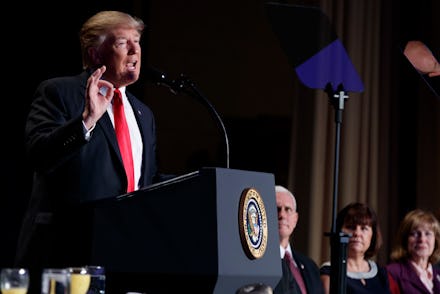What is the Johnson Amendment? What to know about the law Trump vows to "destroy."

At the National Prayer Breakfast on Thursday, President Donald Trump vowed to "destroy" the Johnson Amendment – a tax provision designed to help maintain the separation of church and state in the United States.
"I will get rid of and totally destroy the Johnson Amendment and allow our representatives of faith to speak freely and without fear of retribution," Trump said in his remarks before a gathering of faith leaders.
Trump seems intent on destroying just about everything, but here's what you should know about his latest target:
What is the Johnson Amendment?
The Restriction of Political Campaign Intervention by Section 501(c)(3) Tax-Exempt Organizations – also known as the Johnson Amendment – prohibits organizations like churches and charities from participating in campaigns for or against specific political candidates under threat of losing their tax-exempt status.
It was introduced in 1954 by former Democratic President Lyndon Johnson — then a Texas Senator — and passed by a Republican Congress and signed into law by Republican President Dwight D. Eisenhower.
Trump courted Evangelical voters during the campaign by vowing to repeal the provision, telling Florida pastors in August he would "take this into my own hands and I'm going to figure a way that we can get you back your freedom of speech."
Trump has not said how he plans to scrap the Johnson Amendment, but doing so would allow religious leaders to endorse candidates from the pulpit and churches to pour money into campaigns – essentially giving them the political power of Super PACs, according to the Atlantic.
In his remarks Thursday, Trump said that freedom of religion was under "serious, serious threat."
"Freedom of religion is a sacred right, but it's also a right under threat all around us," Trump said. "And I've never seen it so much and so openly as since I took the position of president."